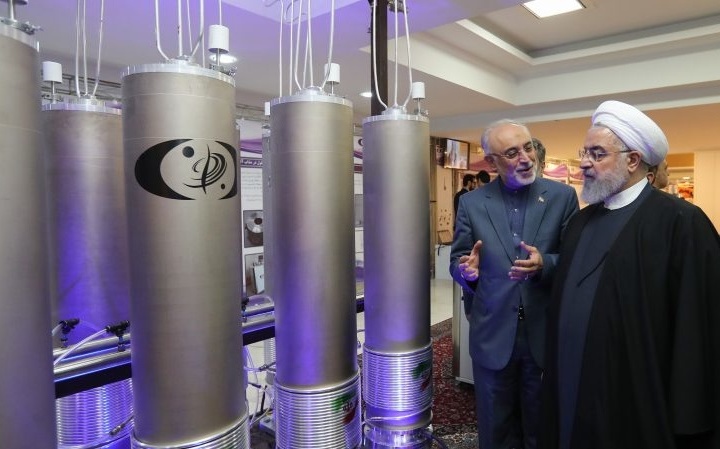President Hassan Rouhani (R) and the head of Iran’s Atomic Energy Organization Ali Akbar Salehi inspecting a nuclear plant, Tehran, April 9, 2019
Iran’s uranium stockpile is now more than 12 times the limit specified in the 2015 nuclear deal between Tehran and the remaining 5+1 Powers (UK, France, Germany China, and Russia).
The International Atomic Energy Agency said in its latest report that the stock of uranium, up to 4.5% in enrichment, is now 2,442.9 kg (5,385.6 pounds).
The 2015 agreement set a limit of 202.8 kg of low-enriched uranium, with Iran shipping all of its 20% stock out of the country. However, following the Trump Administration’s withdrawal from the deal in May 2018 and its imposition of sanctions in November, the Rouhani Government began suspending adherence to some provisions.
Tehran also has gone beyond the deal’s limit of 3.67% uranium and has installed advanced uranium centrifuges. However, it has not yet returned to the pre-2015 production of 20% uranium, which potential can be further enriched to a level of more than 90% for use in a military program.
The IAEA also said Iran’s explanation for the presence of nuclear material at an undeclared site, which the Agency did not identify, was “not credible”. An unnamed source said there was no indication that the site was for processing uranium, but it could have been used to store the material.
The IAEA cited another breach with the move of a cascade of advanced centrifuges from an above-ground plant to an underground facility at the Natanz nuclear complex.
The transfer, to withstand aerial bombardment, follows the sabotage of a Natanz building in July. Iranian authorities say the building, holding centrifuges, was damaged by a bomb smuggled into the site.
The Islamic Republic’s Ambassador to the IAEA, Gharib Abadi, tried to hold back the IAEA report: “Any hasty comments should be avoided….Interactions are ongoing with a view to finalize the resolution of the matter.”
At a UN General Assembly meeting, Iranian Ambassador Majid Takht Ravandchi said Tehran and the IAEA “have agreed to work in good faith” and resolve issues.

